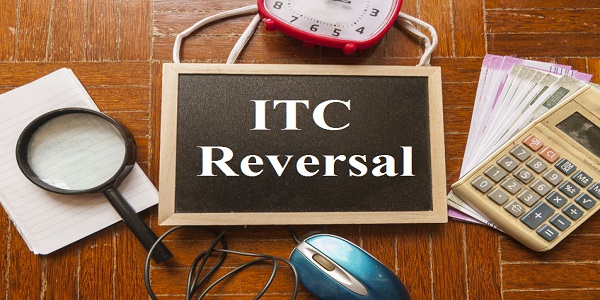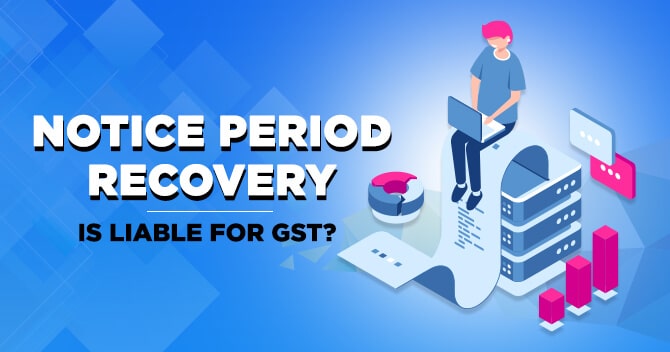
InfoMine
Your Learning Destination

Leviability of Service Tax/ GST On Notice Pay Recovery
-CA. Udit Maheshwari
Background
Generally there are contractual agreements between employer and employee in relation to serving minimum period or notice period i.e. employee has to serve in the organization for minimum period at the time of joining (known as Service Bond) or at the time of resignation he/she has to give a notice for minimum period before leaving the organization (known as Notice period).
If employee breaches any of the condition mentioned supra then he/she has to pay some amount of money to the employer as compensation.
Issues Involved
- Whether the following contractual condition will fall within of scope of “Service” in old regime i.e. Service Tax Regime?
- Whether the following contractual condition will fall within of scope of “Supply” in new regime i.e. GST regime?
- Whether employer is liable to pay “service Tax” or “GST” as the case may be for the amount received from employee in lieu of notice period/bond period not served by the employee?
Related Legal Provisions
Service Tax Law:
Meaning of Service
Section 65B of Finance Act, 1994 defines service as follows:
“Service means any activity carried out by a person for another for consideration, and includes a declared service, but does not include-
- a provision of service by an employee to the employer in the course of or in relation to his employment;
“Declared service includes agreeing to the obligation to refrain from an act, or to tolerate an act or a situation, or to do an act”
Goods and Service Tax
Meaning of Supply- Section 7 of CGST Act 2017
“(1) Supply includes:-
- all forms of supply of goods or services or both such as sale, transfer, barter, exchange, license, rental, lease or disposal made or agreed to be made for a consideration by a person in the course or furtherance of business;
- import of services for a consideration whether or not in the course or furtherance of business;
- the activities specified in Schedule I, made or agreed to be made without a consideration; and
- the activities to be treated as supply of goods or supply of services as referred to in Schedule II.”(omitted by GST Amendment Act, 2018 w.e.f. 01 July 2017)
“(1A) where certain activities or transactions constitute a supply in accordance with the provisions of sub-section (1), they shall be treated either as supply of goods or supply of services as referred to in Schedule II.”; (Inserted by GST Amendment Act, 2018)
(3) Notwithstanding anything contained in sub-section (1); activities or transactions specified in Schedule III shall not be considered either as Supply as Goods nor as Services;
Schedule II consider the following supply as supply of services which is similar to the deemed service in Service tax regime namely- “agreeing to the obligation to refrain from an act, or to tolerate an act or a situation, or to do an act;”
Schedule III specifies “Services by an employee to the employer in the course of or in relation to his employment.”
Analysis
Considering the above facts and provisions, it can be said that if employer and employee relationship exists then any services rendered by employee to its employer should not be considered as service or supply for taxable purpose.
However, there can be a situation as mentioned above where we can interpret that the transaction between employer and employee should be treated as a taxable event/supply and appropriate tax shall be charged on that event if we consider it as an act of refraining to do something or tolerating an act.
In this situation mentioned above employee is paying a sum for not serving the notice period or leaving the office before completing the time stipulated in the bond. In past, above situation has been considered as a taxable event by interpreting and covering it in the scope of “Deemed Service” or “Service listed in Schedule II” i.e., act of refraining.
In GST regime after recent amendment through GST Amendment Act, 2018, if we analyse the situation that Section 7(1)(d) of the CGST Act which included items of Schedule II under the ‘includes’ portion of term ‘supply’, has been omitted retrospectively w.e.f. July 1, 2017, with insertion of Section 7(1A) which states that “where certain activities or transactions constitute a supply in accordance with the provisions of sub-section (1), they shall be treated either as supply of goods or supply of services as referred to in Schedule II”. Before this amendment it was interpreted that any event to refrain an act or tolerating an act is a supply. Hence, reference of Schedule II is now restricted GST is leviable only if the activity/ transaction qualify as supply in terms of Section 7(1) of the CGST Act.
Payment for breaching service period cannot be included in section 7(1) as it is neither of sale, transfer, barter, exchange, license, rental, lease or disposal. Along with that if we see that section 7(3) read with Schedule III, any transaction between employer and employee shall be out of the preview of GST. Henceforth, if the parties to event are excluded from taxable event/supply then any transaction which is related to such events shall also be excluded.
Judicial Views
The Hon’ble HC, Madras in the matter of GE T & D India Limited v. Deputy Commissioner of Central Excise [W.P. Nos. 35728 to 35734 of 2016 and WMP. Nos. 30704 to 30710 of 2016 dated November 7, 2019] held that service tax is not leviable on the payment received by the Petitioner in lieu of notice period paid by the outgoing employees.
Ruling by Court
- The Court observed that the employer cannot be said to have rendered any “service” and has merely facilitated in exit of employee upon imposition of a cost for the sudden exit.
- The definition of “declared service” is not attracted to this scenario as the employer has not “tolerated any act” of the employee but has permitted a sudden exit upon being compensated by the employee.
- Contract of employment has to be read as a whole to charge Service Tax. There are situations in a contract that constitute rendition of service such as breach of a stipulation of non-compete. However, in case of notice pay (in lieu of sudden termination) rendition of service does not arise either by the employer or by the employee. Accordingly, service tax shall not be applicable of notice pay recovery.
Conclusion
On the basis of above analysis and judicial pronouncement, it can be said that GST cannot be levied on payment made for breaching notice period or joining period, however, this is still a debatable issue until any clarification is issued by government.


